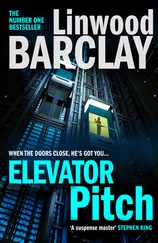Most New York plates were an orangey yellow, but some were white with blue numbers, and others were blue with orange numbers. New Jersey plates came in yellow, or blue, or white.
What proved more helpful were the words across the top of the plate. Jerry pointed to the screen. “Looks like an R and K there.” The last two letters in New York.
“Yeah. So it’s a New York plate. That narrows it down to only a few million,” Delgado said.
Bourque pointed. “What is that?”
“What is what?”
He put his finger directly on the screen.
“Do you mind?” Delgado said, brushing his hand away. “You’re gonna leave a smudge. You’re as bad as my kid.”
“Just look,” he said, pulling his finger back half an inch.
Delgado leaned in, her nose only four inches from the screen. Bourque was pointing to a small sticker of some kind on the bumper, just below the plate.
“I can’t tell what it is,” she said.
It was not the size of a traditional, rectangular bumper sticker people put on their cars to advertise where they’d gone on vacation, or who they were supporting politically. This sticker was round, and about the size of a paper coaster, if not slightly smaller.
“It looks like it’s got letters on it,” he said.
“Yeah. Maybe three. Reminds me a little of a New York Yankees logo. You know? With the N and the Y on top of each other, except here they look separated.”
“So it’s an N , and a Y , and what’s the third letter?” Bourque asked.
“Maybe a C ?” She shook her head. “It’s just going to get fuzzier if I blow it up any more.”
“Hang on,” Bourque said slowly. “I think I’ve seen this before but I’m not sure where. I just have to think...”
He got up out of his chair and rounded the desks until he was back in front of his own computer.
“Want your chair?” Delgado asked, watching as her partner leaned over to tap away on the keys.
“No, it’s okay,” he said. He squinted at his screen and muttered to himself, “Okay, yes, yes, okay.”
“What is it?” Delgado asked.
“Give me a sec. I’m printing it out.”
“Printing what out?”
A few steps away, a printer started to hum, and seconds later a piece of paper dropped into the tray. Bourque walked over, retrieved it, then sat back down in the chair next to Delgado.
He held the sheet of paper in front of her. “What do you think?”
He had printed out a picture of a logo with the letters NYG grouped artistically together.
“Pretty,” she said. “What is it?”
“Remember how Headley’s been going on about making this a more livable city?”
“Yeah, well, that’s really going well,” she said. “So long as you like stairs.”
“It was all part of his campaign. Reducing greenhouse gases, that kind of shit. He’s been doing a big push about making all city cars environmentally friendly. Either making them all electric, or at least hybrid. Part gas engine, part electric.”
“Okay,” Delgado said.
“He kicked it off with his so-called New York Green initiative. They made up these stickers.”
“So... this is a city car,” Delgado said slowly.
Bourque nodded. “Yeah.”
“Well, then maybe this is a dead end,” she said. “I mean, it makes sense that someone from the city, like the building department, the one that looks after elevators, might come by and see the folks at the good ol’ elevator repair shop.”
“Yeah, but then why wouldn’t they talk to the boss? To what’s-his-name, Gunther Willem. And supposedly Otto never mentioned this guy he went out to talk to. According to Willem, Otto didn’t say a word about what his visitor wanted. Why wouldn’t he want to reveal a conversation he had with someone from the City?”
Delgado took her face away from the screen and leaned back into her chair.
“That’s a good question,” she said.
“So all we have to do,” Bourque said, “is find an environmentally friendly sedan that belongs to the City, with a plate ending in 13, and a scratch in the bumper right there, and find out who signed it out on this day.”
“Well,” Delgado said, “how hard could that be?”
Once she’d managed to hail a cab and was safely ensconced in the backseat, Barbara started making calls on her cell. Her first was to the mayor’s office, but she couldn’t get through. When the line wasn’t busy, it rang endlessly.
Not surprising. Given the kind of day it had been, Headley and his team might well have adopted a bunker mentality. Hole up, wait for things to blow over. So far, the fallout from the mass elevator shutdown was not good. At least eight dead. Six of those were possible heart attacks, two were stairway falls.
There were probably a hundred media inquiries per minute coming in to City Hall. The city’s ability to deal with incoming requests for information and interviews had probably already collapsed.
But heading south in a cab, Barbara was struck by how calm — almost convivial — things were. Manhattan sidewalks were always thronged with people moving hurriedly from place to place, and, not surprisingly, given that going upstairs was suddenly a pain in the ass, they were more packed than usual. But people were hardly running about, panicked. Not many of them were even putting one foot ahead of the other. They were standing around, leaning up against buildings and lampposts, chatting with each other, laughing. Every café, bar, and restaurant with outdoor seating was overflowing with people making the best of an emergency.
Can’t get up to your apartment? Might as well have a drink till they give the all clear.
Fuckin’ New Yorkers, Barbara thought. It doesn’t matter what you throw at us. We just carry on.
She threw a twenty at the driver and leapt out of the cab two blocks from City Hall. She ran the rest of the way.
She had always loved this part of Manhattan. The park and fountain south of the city’s seat of government. People playing chess, kids on school tours, the nearby stands selling New York souvenirs and trinkets and hot dogs and pretzels. Tourists heading off to cross the Brooklyn Bridge on foot.
But Barbara didn’t really see any of this now. She had her mind on one thing and one thing only: telling Richard Headley that he, and his supporters, were what linked the elevator incidents.
As she reached the gate to get onto the City Hall grounds, her way was blocked by a uniformed officer. She’d been through this security checkpoint so many times that often she was waved through without flashing her media credentials.
This time, the cop on duty wouldn’t let her through. He said, “Hold it right there.”
“I need to talk to the mayor,” Barbara said.
The cop smirked. “Oh, well, sure. Head right up. I’m sure he’s free.” But he did not let her pass.
“No, seriously,” she said. She dug into her purse and handed him her credentials. “I go in there all the time. Come on, you know me. Right? You haven’t seen me go through here a hundred times?”
“I still have to check your ID and confirm that you’re legit. Threat level’s been raised, in case you hadn’t noticed.”
Barbara sighed, turned around in a gesture of frustration.
Something caught her eye.
Two people heading down the sidewalk. A man and a woman. The woman, at least from where Barbara stood, looked a lot like Arla, and the man had more than a passing resemblance to the mayor’s son.
“Shit,” she said.
“Huh?” the cop said.
Barbara spun back around. “Nothing.”
He handed back her credentials. “Go on in.”
Читать дальше
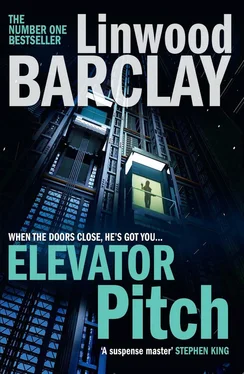
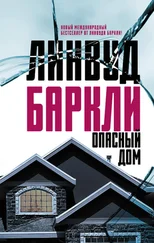
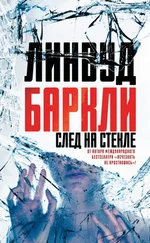
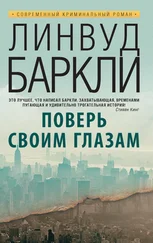
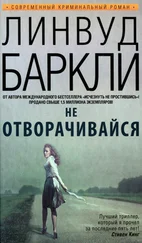
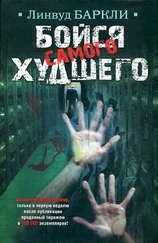

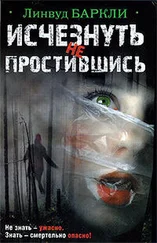
![Линвуд Баркли - Последний выстрел [litres]](/books/412435/linvud-barkli-poslednij-vystrel-litres-thumb.webp)


